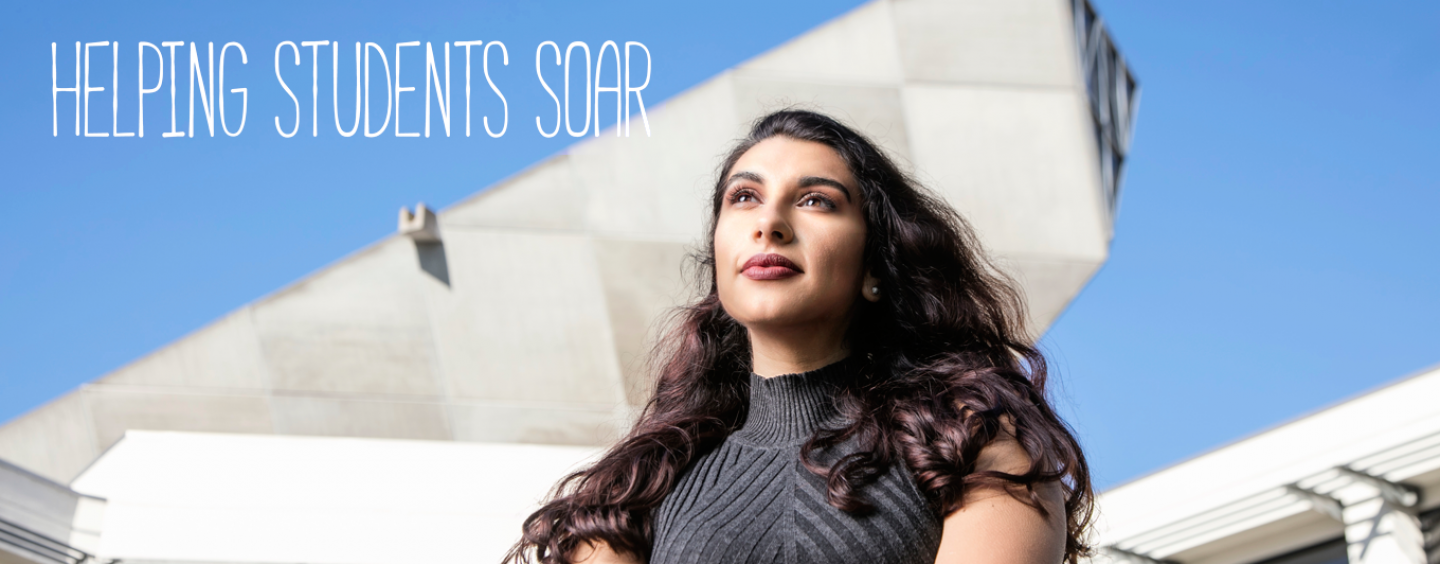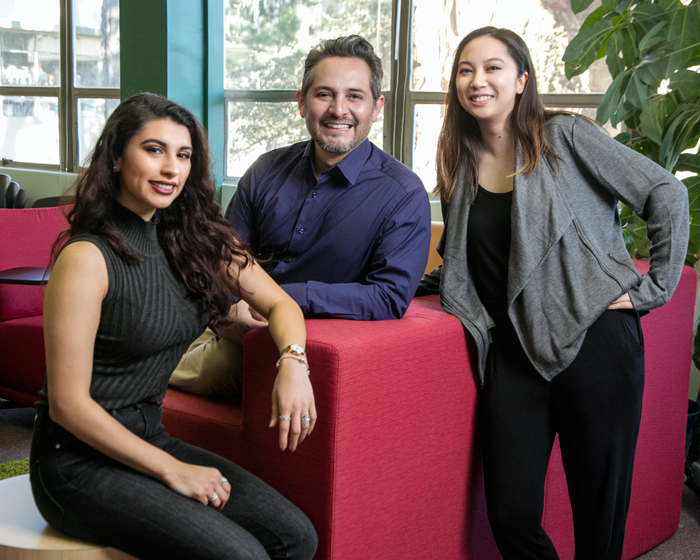Helping Students Soar: With a boost, first-generation college students excel

In fall of 2012, Carolina Talavera Martinez opened a message from the tall stack of emails that greets new freshman. It was an invitation to a program that said it would help her get to know people in the College of Health & Social Sciences (CHSS), where she was entering as a kinesiology major. “OK,” she thought, “I don’t know anyone here, I don’t really know what I’m supposed to do … .” She kept reading. The letter laid out some requirements to enter the program. “The requirements were things that were going to benefit me,” she recalls. “Talk to an advisor in your department, meet with a general-education advisor — so, of course I was going to do it.”
The advising anchored a slate of services Martinez received in the program and helped her choose the classes that she needed without spending unnecessary time on ones that wouldn’t count towards her major. Not only did she finish her undergraduate degree in four years, but she’s already completing her second semester of a two-year master’s program, also in kinesiology.
That pivotal email was from Student Outreach and Academic Retention, or SOAR, then a pilot program launching to serve the specific needs of low-income, first-generation college students like Martinez in their critical first year of school. Since the initial cohort of 30 students, SOAR has blossomed into a success story with a 97 percent retention rate, a 98 percent rate of solid academic standing, and, as of the Fall 2015 semester, federal funding that quadrupled the number of students it serves.
Students within SOAR’s demographics typically face myriad challenges — working more hours to contribute to family income, helping with younger siblings at home, dealing with outsized stress that descends when family needs combine with exam periods. Those factors translate to the highest dropout rate of any group of college students. A 2015 Pell Institute study found just 9 percent of students from bottom income quartile graduate with a bachelor’s degree by age 24, compared to 77 percent for the top income quartile. Among first-generation students alone, only 25 percent graduated within four years and 50 percent within 6 years, according to a 2011 study by the Higher Education Research Institute at UCLA, which also found that graduation rates at public universities lag far behind private schools.
“The quicker you get these higher-risk students through, the more likely they are to finish,” says CHSS Dean Alvin Alvarez, who, together with former Student Resource Center Director Jessica Kongthong, designed the program when he was the College’s associate dean. “We know that working alone can add one or two years to their education,” he says — time that can increase debt and decrease earning potential. “The more you drag it out the less likely there will be positive outcomes.”
Even when first-generation students have supportive families who value education, as Martinez did, once they arrive on campus, they typically lack a support system. “They often don’t have that kind of footing — brothers, sisters, aunts and uncles who can help them navigate at the institutional level. They get here and they’re all alone,” Alvarez says. “SOAR gives them somebody to walk the path with.”
More than advising
Current SOAR director Juan Carlos Gonzalez understands firsthand how the students he serves can lose their way. When he headed to San Diego State in the early 1990s, he met both the low-income and first-generation criteria. He felt lost. As he struggled, there were people he calls “instrumental” in helping him stay on track. “I feel like we are that entity for some of these students,” he says.
— Juan Carlos Gonzalez, SOAR Director
Student support goes well beyond academic advising. SOAR has tutoring available and offers its students priority registration — a benefit Martinez said made a big difference, though not in isolation. “If I just had the priority registration and didn’t have the advising, I wouldn’t have known what classes to choose,” she says. Academic requirements change as programs evolve, she adds, so having an ongoing relationship within her department kept her on track to finish in four years.
One of the services Martinez valued most wasn’t academic. She often talked to SOAR advisors when the stress became too much. “Many of our advisors have clinical experience, so they’re able to delve deeper than just grades,” says Gonzalez. “The social piece is a really strong part of the success of this program.” Advisors maintain a caseload and track student progress. If they see a student who’s not doing well, they engage in “intrusive advising” — a hated term but a useful tool, Gonzalez says. They “intrude” with emails, phone calls and text messages. “It’s the idea that we’re not just here to answer your questions, we’re here to support you,” he says, adding, “If you give us an inch, sometimes we’ll take the foot if we feel that’s something that you need.”
But the program can’t do everything. A student came to them in financial straits; she needed to help support her mother in the wake of her father’s death. But SOAR doesn’t offer direct grants. They hope to in the future, Gonzalez says, and in the meantime they point students to external opportunities. “That’s part of the services we provide — to say, ‘Even we don’t know, we’ll figure it out together.’”

Carolina Talavera Martinez with SOAR Director Juan Carlos Gonzalez and SOAR Academic Coordinator Taryn Wong.
A pilot that took off
SOAR got its start as a specialized program within the College’s Student Resource Center, which still serves all comers. But back in 2012, Dean Alvarez says, the College recognized that it was losing a lot of first-generation, low-income students of color who might not know the potential value of walking through that door. “We needed to be more proactive about reaching those populations,” he said. That meant structuring the initial program so that those students had to come in to get advising and mentorship.
In 2015, the SOAR team landed $1.1 million in funding from Student Support Services (SSS) TRIO, a federal program aimed at helping low-income Americans enter college. The College’s numerous health-focused majors qualified it for support aimed at STEM fields (Science, Technology, Engineering and Math). The change expanded SOAR to 120 active students, allowing the program to serve students for two years instead of just one, and including upper-division and transfer students. Disabled students became a third supported demographic, but two-thirds of enrollees must be both low-income and first-generation. That’s not a problem for CHSS — Alvarez estimates that 70 percent of the College’s student body meets that criteria.
“For every one student you’re serving, there are three others who need the services and aren’t getting them,” Gonzalez says. He plans to look for ways to increase the size of the program when he rewrites the grant next year. A separate SSS TRIO program serves SF State’s other majors.
— Dean Alvin Alvarez
Return on investment
The more students CHSS can elevate, the better, Alvarez says. He notes that there’s a generative effect — these students often circle back to serve society’s vulnerable populations. Martinez is a case study: Her graduate work is preparing her to address the health needs of Latinas.
But Alvarez emphasizes the greater good. “Programs like this nourish our future,” he says. “Many of these students never thought they’d get out of their neighborhoods, or out of the fields or out of a kitchen. So when SOAR succeeds, that means you’re getting a whole new generation of 120 students to think, ‘I didn’t think I could do this … now, what else can I do? Can I get that master’s or that doctorate? Can I become a physical therapist, a nurse practitioner, a physician?’”
With the right support, the program has already shown, such professional tracks go from being alien to being achievable. “That’s the empowering message of SOAR, that this is within you,” Alvarez says. “When a program like this is at its best, it opens students up to the possibilities in themselves.”
Tags